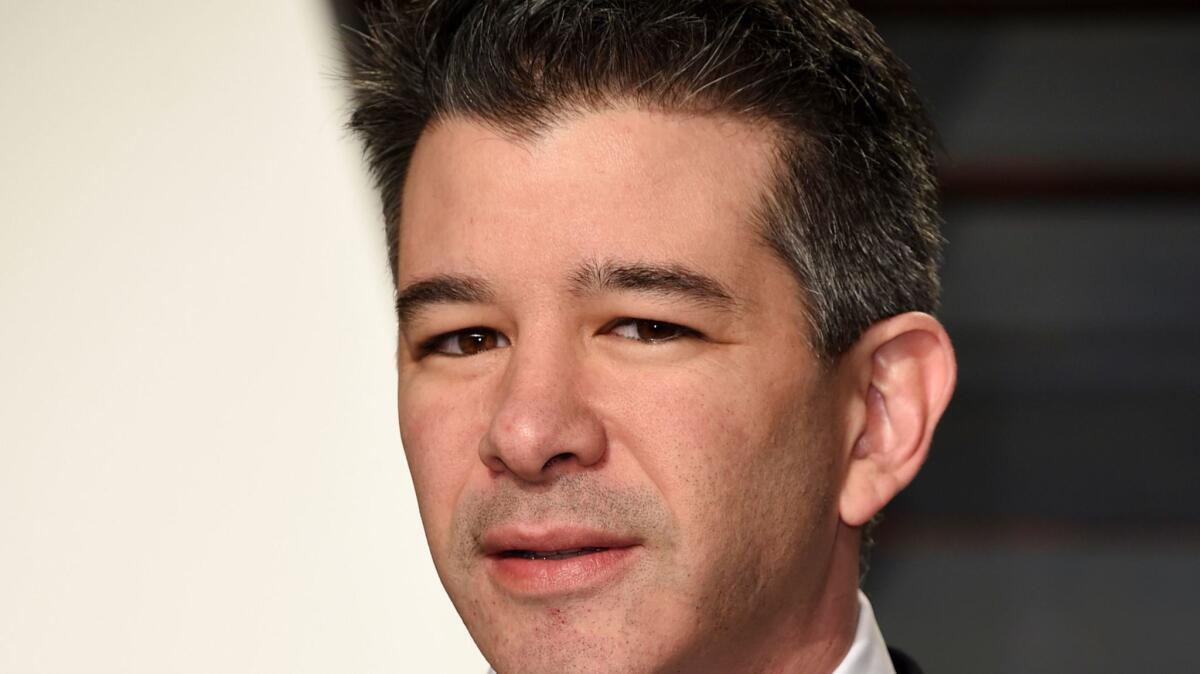Early Uber investor sues co-founder Travis Kalanick, accusing him of fraud

Ever since Uber co-founder Travis Kalanick resigned as the company’s chief executive in June, there were rumors that he was plotting his return. On Thursday, Benchmark Capital Partners, one of the earliest investors in the ride-hailing company, filed a lawsuit against Kalanick with the hope of squashing any such plans.
In the suit filed in Delaware Chancery Court, the Menlo Park, Calif., venture capital firm alleges that Kalanick breached his fiduciary duty and contractual obligations by stacking the company’s board with allies to shield his conduct from redress.
The suit contends this was done to “clear the path for his eventual return as CEO — all to the detriment of Uber’s stockholders, employees, driver-partners, and customers.”
The suit names both Kalanick and Uber, but it seeks damages only from Kalanick himself.
Benchmark alleges that in mid-2016, Kalanick committed an act of fraud when he convinced the board to approve of three new board seats for which he would have appointment power, without first informing them of a series of events he was allegedly involved in or privy to that would later lead to his forced resignation.
Kalanick stepped down as Uber’s CEO in June after those controversies came to light. They included a lawsuit by Google’s self-driving-car subsidiary, Waymo, alleging theft of trade secrets; another lawsuit by a woman in India who alleged Uber obtained her medical records after she was raped by one of the company’s drivers; and widespread allegations of sexual harassment at the firm.
Benchmark, which led the charge in pressuring Kalanick to resign, cited all three cases in its suit as examples of Kalanick’s mismanagement.
“Kalanick knew Benchmark never would have approved … the three new Board seats if Benchmark had known the truth about Kalanick’s prior conduct,” the suit reads. “Kalanick also understood that these matters, once revealed, would likely force him to resign as Uber’s CEO, and thus sought to grant himself a way to play an ongoing leadership role at Uber once the truth came out.”
Uber declined to comment. In a series of tweets Monday, Benchmark said that it was still bullish on Uber as a company.
Waymo saw an opportunity to further its own case against Uber and the ride-hailing company’s former self-driving vehicle guru Anthony Levandowski, with a spokesperson for the firm issuing a statement saying “there is significant and direct evidence that Uber is using stolen Waymo trade secrets. There is also significant evidence that Uber leadership knew about Levandowski’s misconduct and, rather than do the right thing, tried to conceal it.”
Kalanick furthered Benchmark’s suspicions that he was angling for a return to power when, after resigning as CEO and departing the board seat reserved for the CEO, as required, he immediately re-appointed himself to one of the three vacant board seats. The lawsuit alleges that he then refused to sign an agreement that would ensure the two vacant board seats would be filled by candidates who are “independent, experienced, unbiased, and diverse, and subject to the approval of all then-current directors other than one.”
Sources close to Kalanick said he had regretted his decision to resign, and that he was interested in returning to a leadership role at the company, but it is unclear if he had a plan to do so.
A spokesperson for Kalanick dismissed the claims in a prepared statement, saying that the lawsuit was without merit and “riddled with lies.”
“This is continued evidence of Benchmark acting in its own best interests contrary to the interests of Uber, its employees and its other shareholders,” the spokesperson said. “Benchmark’s lawsuit is a transparent attempt to deprive Travis Kalanick of his rights as a founder and shareholder and to silence his voice regarding the management of the company he helped create. Travis will continue to act in the interests of Uber and all of its stakeholders and is confident that these entirely baseless claims will be rejected.”
The lawsuit is, in essence, a fight for control over Uber’s board, and such battles are not unusual, according to legal experts.
“But to make those accusations against the founder of a company whose blood and sweat turned Uber into what it is today, yes, that is a bit peculiar,” said Dan Handman, an attorney with Hirschfeld Kramer.
Lawsuits of this nature can take years to litigate, Handman said, and to secure even a preliminary injunction, the onus is on the plaintiff to prove that they are likely to succeed at trial, and that they would suffer some sort of irreparable harm unless a preliminary injunction is granted.
“It’s fair for them to say [Kalanick] is trying to exert his influence on the company, that he hasn’t severed ties as completely as he would have the company believe, but what happens as a result of that is entirely speculative,” Handman said.
In fraudulent concealment cases, plaintiffs would also have to prove that they didn’t actually know what was going on.
“The amount that Benchmark knew, what they knew, how they knew it, and what their response was, is all critical,” Handman said. “If it turns out that Benchmark was well aware of the very things they’re complaining about, their lawsuit won’t get very far.”
If Benchmark gets what it wants, the three board seats Kalanick allegedly controls would be eliminated, and Kalanick would be blocked from participating in any meetings, votes, or other activities with Uber’s board. Kalanick — and not Uber — would also have to pay unspecified damages and legal fees to Benchmark.
And although the lawsuit adds another bump in the road for Uber, Benchmark must think it’s necessary to protect its investment in what’s considered the world’s most valuable start-up. The lawsuit alleges that Kalanick’s “improper role on the board” has already had a negative effect on the company’s search for a new CEO, and that potential candidates have withdrawn from the process because of his participation.
“Kalanick’s improper actions, if allowed to continue, would cause irreparable harm to Uber by exposing it to reputational, regulatory and other risks,” the firm said.
Twitter: @dhpierson
UPDATES:
4:25 p.m.: This article was updated to include more details from the lawsuit and comment from Travis Kalanick’s spokesperson and from attorney Dan Handman.
This article was originally published at 1:30 p.m.
More to Read
Inside the business of entertainment
The Wide Shot brings you news, analysis and insights on everything from streaming wars to production — and what it all means for the future.
You may occasionally receive promotional content from the Los Angeles Times.












